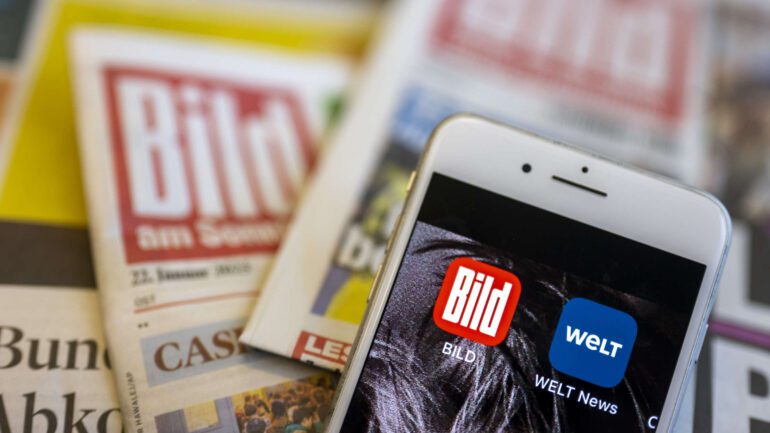TL;DR:
- Germany’s best-selling newspaper, Bild, is replacing editors with AI as part of a business model overhaul.
- The move comes after a series of sex scandals and a declining readership.
- The newspaper’s owner, Axel Springer, aims to shift towards digital journalism and improve earnings.
- Job cuts are expected, with many roles being replaced by AI systems.
- Bild is also merging regional titles and closing smaller offices.
- The publication is still dealing with the fallout from the ousting of its former editor over abuse allegations.
- The media mogul in charge of Axel Springer has apologized for attempting to influence the last German election through Bild.
- The company aims to become “digital only” in the coming years and expand its presence in the US.
Main AI News:
Bild, the esteemed best-selling newspaper in Germany, is undergoing a significant transformation in response to a series of damaging sex scandals, opting to replace its editors with artificial intelligence (AI). With a steadfast commitment to rejuvenating its reputation and combating a decline in readership, the tabloid newspaper is embracing a groundbreaking business model overhaul.
Owned by the renowned publishing giant Axel Springer, Bild recently announced extensive staff reductions as part of a strategic shift from print to digital journalism. While the precise number of job cuts remains undisclosed, sources speculate that several hundred positions will be affected, with many being replaced by AI systems.
In an internal communication obtained by the German newspaper Frankfurter Allgemeine, executives lamented the inevitable departure of colleagues whose roles will be automated or replaced by AI in the digital landscape. Positions such as editors, print production journalists, proofreaders, photo editors, and assistants will undergo fundamental transformations or cease to exist altogether.
Furthermore, Bild intends to consolidate various regional titles and shutter smaller offices as part of its restructuring endeavor. This comprehensive initiative aims to revitalize the publication’s fortunes in the wake of a tumultuous period that has severely impacted both its financial standing and public perception.
The newspaper, known for its politically motivated and occasionally sensationalist coverage, is still grappling with the repercussions of former editor Julian Reichelt’s ousting. Allegations of his exploitation of power to coerce junior staff members into inappropriate relationships led to a €2 million (£1.7 million) settlement paid by Bild, despite Reichelt vehemently denying the claims. Legal proceedings against him are ongoing.
Additionally, Axel Springer’s influential media mogul, Mathias Döpfner, issued an apology in April after leaked text messages exposed his attempts to manipulate Bild’s content to sway the outcome of the recent German election. These messages also revealed his controversial opinions targeting climate change activism and expressing disapproval towards “intolerant Muslims.”
Meanwhile, Bild’s management is striving to reverse the decline in audience numbers. Its circulation dwindled to just over 1 million by the end of last year, a stark contrast to its peak of 4.5 million readers at the turn of the millennium. Axel Springer has outlined a plan to enhance earnings from Bild and its sister publication Welt by €100 million over the next three years, achieved through increased sales and cost-cutting measures.
Mr. Döpfner has expressed his aspiration to transition Bild and Welt into exclusively digital platforms in the near future, with the goal of attracting over 20 million daily online visits by 2026. Additionally, the media group, whose major stakeholder is private equity titan KKR, aims to expand its presence in the United States, leveraging ownership of Politico and Insider.
As part of Bild’s transformation, the company will reduce the number of its regional papers from 18 to 12. The consolidation process entails merging city-specific titles into broader regional publications and closing smaller offices. However, the German Journalists Association (DJV) has voiced criticism regarding these cuts.
Frank Überall, the DJV federal chairman, expressed concern, stating, “If Mathias Döpfner wants to sacrifice the group’s cash cow, it is not only unfair to the employees but also economically foolish. Reducing regional reporting diminishes the quality of service for readers and, consequently, leads to a decline in readership.”
Conclusion:
Bild’s decision to replace editors with AI signifies a bold step toward digital transformation in the newspaper industry. This move reflects the challenges faced by traditional print media in adapting to evolving consumer preferences and a rapidly changing media landscape. By embracing AI technology, Bild aims to streamline operations, reduce costs, and potentially reach a broader online audience. However, this strategic shift also raises concerns about the future of journalism and its impact on employees. The success of Bild’s transformation will depend on its ability to maintain editorial quality and credibility while effectively leveraging AI to meet the demands of a digital market.

